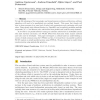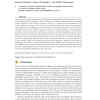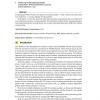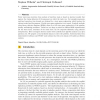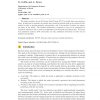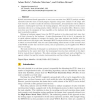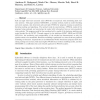136
click to vote
WCET
2010
14 years 12 months ago
2010
To take full advantage of the increasingly used shared-memory multicore architectures, software algorithms will need to be parallelized over multiple threads. This means that thre...
175
click to vote
WCET
2010
14 years 12 months ago
2010
The assumption of task independence has long been consubstantial with the formulation of many schedulability analysis techniques. That assumption is evidently advantageous for the...
106
click to vote
WCET
2010
14 years 12 months ago
2010
Schedulability analysis for hard real-time systems requires bounds on the execution times of its tasks. To obtain useful bounds in the presence of caches, cache analysis is mandat...
109
click to vote
WCET
2010
14 years 12 months ago
2010
Computing tight WCET bounds in the presence of timing anomalies
137
click to vote
WCET
2010
14 years 12 months ago
2010
ing Abstract Caches with Symbolic Pipeline Analysis Stephan Wilhelm1 and Christoph Cullmann1 1 AbsInt Angewandte Informatik GmbH, Science Park 1; D-66123 Saarbr
105
click to vote
WCET
2010
14 years 12 months ago
2010
This paper considers the use of Extreme Value Theory (EVT) to model worst-case execution times. In particular it considers the sacrifice that statistical methods make in the reali...
140
click to vote
WCET
2010
14 years 12 months ago
2010
Hybrid measurement-based approaches to worst-case execution time (WCET) analysis combine measured execution times of small program segments using static analysis of the larger sof...
117
click to vote
WCET
2010
14 years 12 months ago
2010
Calculating the worst-case execution time (WCET) of real-time tasks is still a tedious job. Programmers are required to provide additional information on the program flow, analyzi...
109
click to vote
WCET
2010
14 years 12 months ago
2010
Current worst-case execution time (WCET) analyses do not support programs using dynamic memory allocation. This is mainly due to the unpredictability of cache performance introduc...
120
click to vote
WCET
2010
14 years 12 months ago
2010
Safe and tight worst-case execution times (WCETs) are important when scheduling hard realtime systems. This paper presents METAMOC, a modular method, based on model checking and s...
